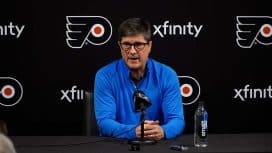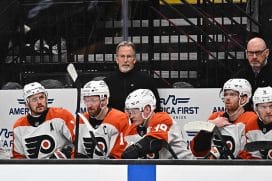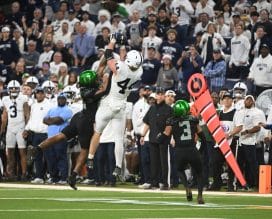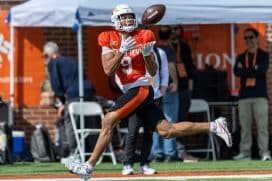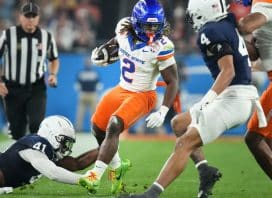Flyers
Flyers 5: Takeaways from the 2020-21 Season
By Kevin Durso, Sports Talk Philly editor
The Flyers season is now completed. A disappointing and frustrating year has come to an end.
Before we fully turn the page on the previous season and look ahead to an eventful offseason that appears to be on tap, it’s still fair to look back at the previous season and wonder what went wrong, where did it go wrong, and what else can we take away from it?
From a mid-January start with some early positive results to one final win/loss to the New Jersey Devils in mid-May to conclude the 56-game campaign, here are five takeaways from the season.
1. Issues in Goal
Obviously, the biggest area of attention and concern surrounding Carter Hart. At the beginning of the season, you saw the two Flyers netminders doing everything in their power to help win games. And for the most part, they were doing it. It wasn’t always the lowest-scoring games, but it was enough.
As the Flyers struggles continued elsewhere, it wore down the goaltending. Carter Hart lost his confidence and couldn’t seem to make the routine saves seem easy. Brian Elliott wasn’t able to handle the intense workload of being a No. 1.
As those two issues compounded, it led to consistent struggles from the blue paint that were only increasingly noticeable due to the struggles from the rest of the team.
Carter Hart will be back next season. He’ll be looking to build back his confidence after a disappointing season where he certainly showed some frustration. For Elliott, that remains to be seen. He expressed a desire to be back and has been a good mentor for Hart, but you have to wonder if that is one area of change where the Flyers could look for somebody more capable of carrying a larger workload.
2. The Niskanen Effect
It was one of the biggest questions going in. How do the Flyers replace Matt Niskanen?
Well, the replacement by addition didn’t even make it through the season. Erik Gustafsson was traded at the deadline to Montreal. Shayne Gostisbehere wasn’t able to fill much of the void either, at least from the defensive sense, as his up-and-down career continued and faced a number of obstacles.
The real area of concern comes from guys like Ivan Provorov, Travis Sanheim and Phil Myers. Provorov had his moments and delivered some strong games, but also had moments that were truly troubling. He was far from his usual consistent self.
Sanheim had his moments of struggle and moments of good performances as well. Toward the end of the season, he started to get more consistent in his performances and be on the better end of results. He has something to build on.
Myers didn’t take that step though. He was in and out of the lineup, at times due to injury, but also due to performance. He has a lot of room to grow still, and perhaps the thought that he could just step into a top role immediately is beyond his potential. Not every prospect is a home run.
Anyway, the Flyers spent the entire season searching for the answer to this question. What is resulted in was their most glaring need in the offseason.
3. Lack of Growth
The lack of growth among prospects didn’t extend to just the defensemen. There were forwards who also took a step back.
Kevin Hayes delivered similar numbers by pace, but there were nights where he would make some really glaring mistakes or not have the legs. Travis Konecny’s production took a hit. Nolan Patrick didn’t stand out for much of the season. Oskar Lindblom had his moments, but the effects of both cancer and COVID were still clearly taking their toll at times.
Even bottom-six guys like Nicolas Aube-Kubel took a step back in what they were able to bring.
There was one clear exception: Joel Farabee. To the very last game, Farabee was providing energy regularly and producing at a consistent rate. At 21, he reached the 20-goal mark in just his second season.
4. The COVID Pause
There isn’t one particular game that stands out as the one that turned the Flyers season into the ground, but the COVID pause that happened in mid-February can be identified as the spot where things started to turn.
The Flyers had won on Feb. 7, appearing to continue to bounce back from rough results and pick up wins. They weren’t winning games pretty, but they were finding a way. That all stopped after they returned.
It was apparent at the start that the team was so shorthanded, they simply couldn’t keep up with the competition. But as more guys returned, it was obvious that this team’s makeup wasn’t right. The luck ran out and the team was not finding ways to win, but instead losing by margins of epic proportion.
It was a strange year for sure, so the COVID effect is one that most teams will try to overlook. But the play on the ice in the months that followed this pause were very telling and why such change may be needed this offseason.
5. Snowball Effect
The Flyers had opportunities to turn this season around. When things started to go south in early March, they could have used a clutch comeback win as the momentum builder. So often, those games not only went by the wayside, but produced baffling losses.
These games just only piled up. The Flyers were not only losing with regularity, but losing badly. A 6-1 loss to the Buffalo Sabres on March 31, the final day of a dreadful month, was pretty much the dagger, even though the team wasn’t officially eliminated from the playoffs for another month.
Even in the games that followed such a loss to Buffalo, the snowball effect that this season continued to have was evident. The Flyers simply could not stop the bleeding. They would have a successful night, maybe get a win, then follow it up with a loss. Or, worse, they would play well, but still find ways to lose.
It was their downfall this season, that after a solid start record-wise, they couldn’t put it all together. They continuously made the same mistakes and couldn’t get out of their own way.
Throughout the week, we’ll hear more about the reasons why this happened, at least to those that matter. We’ll hear Alain Vigneault’s theories on the season’s downfall. We’ll hear what Chuck Fletcher thinks of the season and the offseason ahead. We’ll hear which players were dealing with injury or wished their was more practice time or that COVID hadn’t disrupted the season.
It won’t change the results, nor will it make this offseason any less important than it has become.
